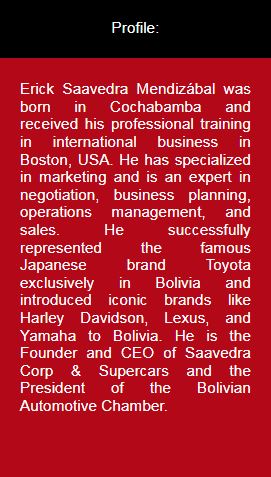Raúl Serrano
The CEO of Supercars Automotors aims to break paradigms and establish new options for renewable energy mobility in the country, as part of the challenges towards the sector’s transition.
1How did the Super Cars Automotors initiative come about and what is the main objective of this newly created automotive company?
The creation of Supercars was born as an alternative for automotive electrification in Bolivia. Our electric vehicles are a sustainable investment aimed at reducing the environmental and economic impact that Bolivia will face due to increasingly high fuel subsidies. Our vehicles are very affordable and easy to recharge; for users, they are fun to drive and safe. Once the product’s life ends, it is environmentally friendly in its disposal process, as 98% of the components can be recycled. The recharging cost for these vehicles does not require major modifications or three-phase charging systems. Our ecosystem only needs the wall plug to be grounded. The system is as simple as charging a phone or tablet, which could last 6 to 8 hours for a vehicle with a 600-kilometer battery range.
The savings that an electric vehicle can provide have many advantages compared to a traditional combustion engine car. The recharging cost of an electric vehicle could be around 1,500 Bolivianos/ $us 216 per year, which is extremely low compared to the monthly fuel costs of a medium-sized SUV, for example.
The battery warranty is 8 years, representing a significant strength as it accounts for 60% of the vehicle’s value. Additionally, as electric vehicles, they do not require traditional preventive maintenance. We are confident that SuperCars, with its AIQAR brand, will become one of the favorite brands in Bolivia in the coming years.
2Based on your experience in the field, how do you see the automotive market in Bolivia?
The Bolivian market has one of the oldest and most polluting vehicle fleets in the region, with a population of over two million (legal) vehicles, and approximately 80% of them are over 25 years old. It is also true that there are a significant number of illegal or “chuto” vehicles that are not registered in the statistics. According to studies by the Bolivian Automotive Chamber, it is estimated that nearly a million vehicles are in the country illegally, consuming gasoline or other fossil fuels.
It is important for the government to implement policies to renew the vehicle fleet, as it is unsustainable for more than 10% of the GDP (Gross Domestic Product) to be allocated to literally burn fuel through the import and consumption of fuels. On the other hand, something that statistics have not yet shown is the health impact of using heavy metals to increase octane levels, which can cause irreversible damage.


While exempting electric and hybrid vehicles from taxes becomes an incentive to promote their consumption, it is also important to determine the operating life of the units. It is very difficult to think that a vehicle over 20 years old can be efficient, non-polluting, and safe for both the user and the environment, as its lifecycle has already ended. Moreover, finding spare parts for these very old vehicles is almost impossible, forcing owners to make custom adaptations to find parts to keep them running.
3The automotive sector is considered one of the largest generators of greenhouse gases. How has this situation affected companies that import vehicles?
The greenhouse effect is an undeniable reality. Last week, the northern hemisphere recorded the highest temperature ever, exceeding 56.7 degrees Celsius on land and over 34 degrees Celsius in the sea in California, USA. Global automotive industry policies are aimed at producing smaller engines with new technologies to help reduce pollution and the planet’s overall temperature. The trend is towards migrating to other technologies such as hydrogen and ethanol, which different brands and countries are developing. For the European Union, the “zero fuels” policy by 2035 is a reality. In the region, Chile was one of the first countries to determine that by 2035, combustion engine vehicles will no longer be allowed, and by 2040, trucks will stop using diesel. Bolivia, under the “Mother Earth” law, should follow the European Union’s steps and consider implementing a carbon-free policy.
4At the moment, the automotive sector still has a significant dependence on fossil fuels. However, your company is promoting the transition to clean and renewable technologies for less polluting transportation…
Our goal is to help transition to automotive electrification, which will have an environmental impact. Electric vehicles, with fewer parts and simpler designs, do not generate emissions or noise. We believe that the transition to electric vehicles will be very natural for many people. For many people, driving a vehicle that doesn’t make noise or vibrations is difficult, but it is a natural evolution, much like the transition from fax to email.
5Do you think Bolivia has a comprehensive infrastructure that considers environmental variables to reduce environmental pollution from transportation?
Unfortunately, Bolivia does not have a real structure to combat pollution in general, and due to political circumstances, it is not a priority.
6SuperCars Automotors is a young company. What are your most important challenges?
Our biggest challenge will be to electrify the automotive culture in Bolivia, breaking paradigms and establishing new options for mobility with renewable energy. This will be part of our ecosystem and our major challenge.
